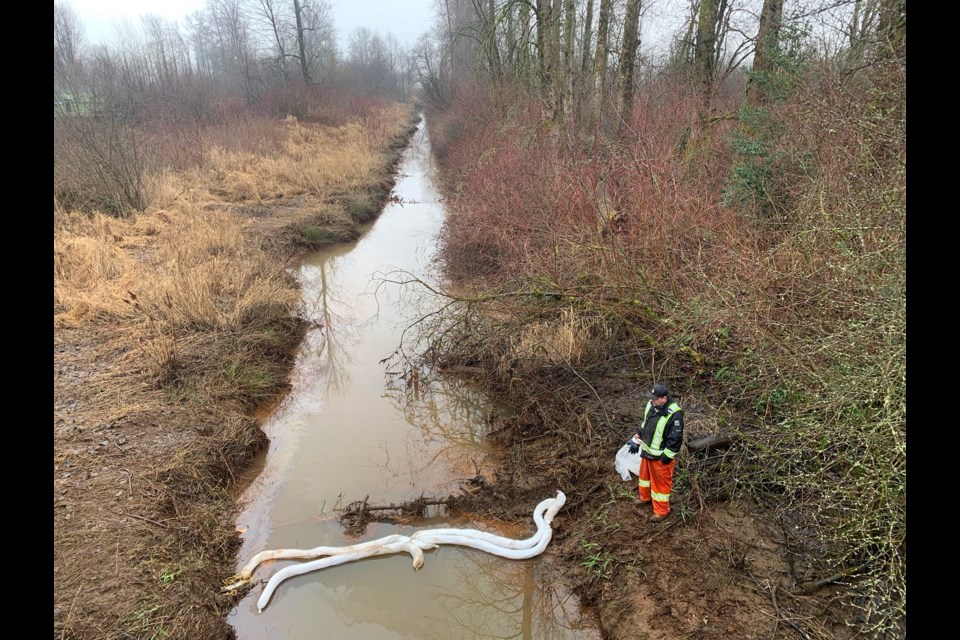A beaver plucked from a diesel fuel spill at the CP Rail yard has died.
The young female beaver was covered in fuel when it was captured last Wednesday (Feb. 9) by volunteers and staff with Critter Care.
Despite "round-the-clock efforts" to save the beaver, it died a few days after it was found, according to a Facebook post by the group last Saturday (Feb. 11).
It was likely living in water polluted by diesel fuel for several days before it was captured and efforts were made to rehabilitate it.
Critter Care staff said the fur was full of diesel fuel down to the skin and the beaver likely ingested the fuel as well, although its stomach was pumped to help it survive the ordeal.
Only now, days later, is the story coming together about what happened.
CP Rail has now confirmed that it was responsible for the diesel spill that happened in a ditch on its property in the Port Coquitlam rail yard.
According to the Ministry of Environment, the amount of fuel hasn't been determined but it was "a large volume" and the spill occurred Feb. 4.
However, CP Rail has said it hired contractors to clean up the fuel.
"Equipment and contractors were deployed to contain the spill, and crews are working diligently to ensure the area is cleaned up and restored," a spokesperson from CP Rail stated in an email to the Tri-City News late last week.
However, within three days the fuel had spread to a creek near a Port Coquitlam park and wildlife preserve where eagles nest.
According to a timeline provided by the Ministry of Environment, a "large volume" of diesel spilled on Feb. 4 and spread to a creek at the south end of Dominion Park in Port Coquitlam on Feb. 7.
A film of fuel could be seen on the creek and the area smelled of diesel.
On Feb. 10, ministry environmental emergency response officers met with city staff to inspect the affected area and surrounding properties.
It's not known how many other creatures may have been affected by the spill.
But diesel fuel can be harmful to fish and birds, according to information provided online by the Environmental Emergencies Environmental Stewardship Branch Environment Canada - Pacific & Yukon Region.
"MDO (Marine Diesel Oil) and refined fuels in general, such as diesel and gasoline, have high aquatic toxicity values due to their relatively high content of naphthalenes."
The City of Port Coquitlam has confirmed that the spill has been upgraded to a 'Code 2' by the Ministry of Environment because wildlife has been affected.
Early investigations have concluded that the diesel fuel migrated to the Port Coquitlam creek via storm drains and drainage channels that lead to Dominion Park.
"We understand that CP Rail have secured an Environmental Consultant to assess the spill and create a clean-up and mitigation plan," stated Joshua Frederick, director of engineering and public works in an email to the Tri-City News.
"This post-spill assessment will help us to understand the full extent of the spill, including how far along the watercourse the fuel was able to migrate. The city is working with MoE staff to ensure CP Rail initiates an adequate and timely remediation of infrastructure and habitat."
Meanwhile, Critter Care has posted online the sad story of the death of the beaver, which took several hours to rescue and clean last week.
On Facebook, Critter Care reported:
"We have worked around the clock the past few days to try and save the beaver that was covered in diesel fuel.
"Unfortunately we were unsuccessful and she passed away today. We are unsure how long the beaver had been living in the diesel-infested swamp, which could have caused serious damage internally.
"We need to stand together and take better care of our planet, this could of been avoided.
"Thank you to everyone who helped support!"




